Passion for the world
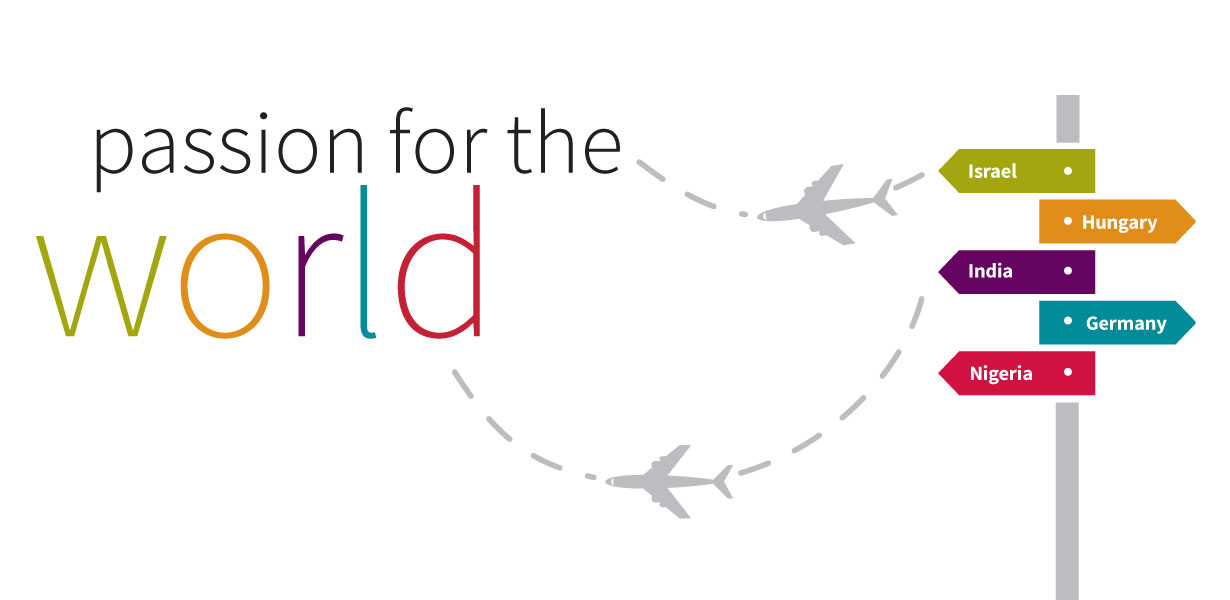
Although the School of Engineering & Applied Science makes its home in St. Louis, our students arrive aware that they are citizens of a global society and with a passion to tackle engineering challenges in all corners of the world, whether it be designing medical devices at a U.S.-based company or building a water treatment system in a school in Africa.

Through the curriculum and extracurricular opportunities that focus on global applications, students learn to think broadly to find answers to the world's largest engineering problems, such as those in energy, the environment, medicine and health. The vast perspectives students and faculty bring into the school from all over the world enriches not only the classroom experience, but hands-on experiences outside of the classroom. By sharing these perspectives, students get a better understanding of the world's needs and ways to meet them.
More than half of Engineering faculty members have an international background, bringing the global perspective directly into the classroom and laboratory environments. Many faculty members have collaborations with peers at research universities around the world, including Patrick Crowley, professor of computer science & engineering, who leads a global Named-Data Networking testbed; Pratim Biswas, assistant vice chancellor, the Lucy & Stanley Lopata Professor and chair of the Department of Energy, Environmental & Chemical Engineering, has collaborations with researchers in India in areas such as clean water, clean air and solar energy; Lan Yang, the Edwin H. & Florence Skinner Professor in Electrical & Systems Engineering, has collaborators in Austria, China, Germany and Japan for her work in lasing systems and applications.
Biswas, also assistant vice chancellor of international programs, says addressing global challenges is a main focus within the school.
"I can't sit within my borders and say 'I'll just tackle what's in St. Louis,'" he says.
“We are absolutely pushed to collaborate with others in other countries, and we do it because the problems are challenging. That brings an added benefit to our students. This is also part of their education that these are not simple problems — you can’t just take a two-week summer trip and solve these problems.”
— Pratim Biswas
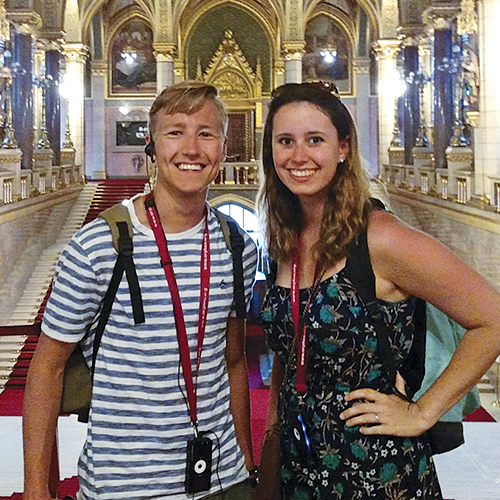
In the 2016-2017 academic year, 11.5 percent of undergraduate students are international students, while 68 percent of full-time master's students and 61 percent of doctoral students come from outside of the U.S.
In addition to addressing global challenges and needs through the curriculum, undergraduate students have a variety of ways to put their global citizenship in action through participation, in student groups and competitions, extended international service trips and more than 100 study-abroad opportunities.
The WashU Engineers Without Borders (EWB) student group, a chapter of the international organization that partners with communities to meet their basic human needs, has about 30 active members who divide their interests among two current international projects: the Mekelle School for the Blind in Ethiopia, where they have installed new lighting systems, water storage and drainage systems, and Roosevelt Hospital in Guatemala, where they repair ventilators and teach local medical students how to maintain the equipment.
The Engineering World Health student group specifically works toward advancing global health by creating devices to meet crucial needs in developing countries. One team of students, led by chapter president Kailin Baechle, a junior majoring in biomedical engineering, is working on a device to pull humidity from the air to create clean water in developing countries with high humidity, such as Madagascar. The team, Water Out of Thin Air (WOOTA), won $25,000 in the 2016 Discovery Competition.
The Discovery Competition, which is in its fifth year, provides students with the opportunity to explore their entrepreneurial interests by developing a product or service in competition for up to $25,000 in cash and legal services.

About 20 percent of teams have designed a product or idea specifically to meet global needs, such as inexpensive, 3-D-printed eyeglass frames with interchangeable lenses, and about half of the teams have created medical devices that could be implemented globally, such as the low-cost spirometer that eventually became the signature product of Sparo Labs.
The Department of Energy, Environmental & Chemical Engineering offers the McDonnell Academy Global Energy & Environment Partnership International Experience, an annual course and summer trip in which students attend lectures at one of the university partners in the McDonnell International Scholars Academy and participate in local culture. Since 2014, the student groups have visited Singapore, Turkey and Hungary, respectively, with a trip to Thailand planned for 2017.
Caroline Avery, a junior majoring in chemical engineering, said the trip to Hungary in the summer of 2016 was the perfect opportunity to tie her passion for chemical engineering with a once-in-a-lifetime cultural exploration.
"It allowed me the opportunity to savor some of the most fascinating and life-changing ventures that I never would have been exposed to otherwise," Avery says. "It empowered me as a chemical engineer to see some of the work and problems I solve every day in St. Louis literally in action around the world."
Biomedical engineering students get hands-on experience in creating orthotic devices for children with cerebral palsy in an annual trip to Hong Kong and China. The students work with Hong Kong Polytechnic University students to assess the needs of the children then create custom-fitted devices to help the children walk and build muscle strength.
Jessica Lin, a senior majoring in biomedical engineering, said work was integral to her education.
"I was eager to see the impact we had on the children in helping them walk for the first time," she said. "This will be a trip I will remember for the rest of my life, the fuel for my motivation for pursuing an MD/PhD and serve underserved communities and people internationally ."
International students in School of Engineering & Applied Science bring their own global perspective into the student body.
“In a world that is constantly globalizing, being able to connect with people from other cultures is going to be a necessary skill.”
— Jay Vaidya
Jay Vaidya, a junior majoring in computer science and math, with a minor in linguistics, is from Mumbai, India, and came to WashU at the recommendation of a family friend.
He says international students develop a diverse culture and environment.
Amir Ben-Nun and Shachar Dekel are exchange students in computer science from the Interdisciplinary Center Herzliya (IDC) in Tel Aviv, Israel, one of the McDonnell International Scholars Academy universities. Not only do they bring their perspective as international students, but they bring life experience different from most U.S. undergraduate students — each served a mandatory term in the Israeli military before starting college. Ben-Nun was a combat soldier before becoming injured, then became a programmer for the rest of his term, and Dekel was in the intelligence department, serving five years as a programmer during his term. He now works as a programmer in addition to being a full-time student at IDC.
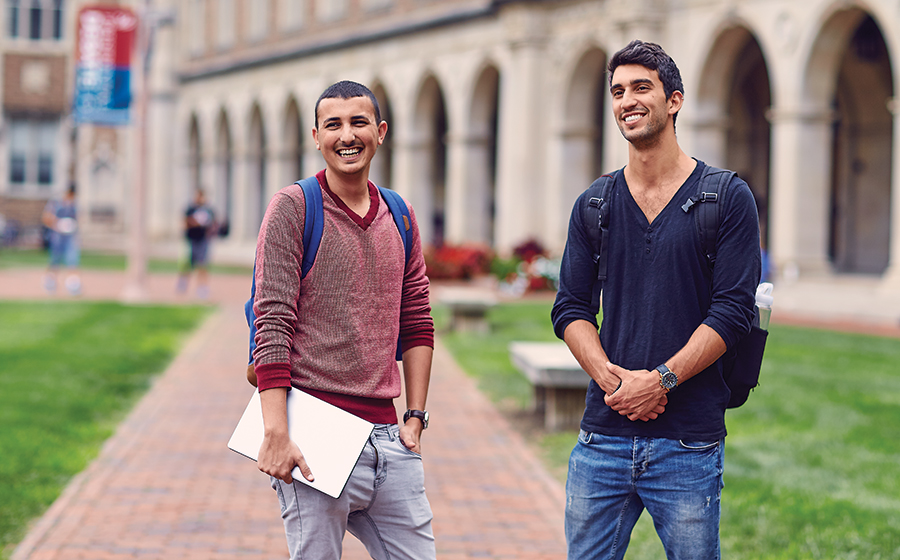
Dekel says the WashU curriculum is very practical.
"The teaching here is more about actual experience," Dekel says. "They don't tell you what to do – you have to actually learn it yourself, which is very important for programmers and computer science."
The McDonnell International Scholars Academy, a network of 32 universities worldwide, focuses on attracting talented international and domestic doctoral students in areas such as climate change, energy and environment, public health and social development. Currently, there are 21 scholars from around the world earning doctorates in Engineering. Scholars also participate in social and cultural experiences that focus on international issues. Since the Academy began, 13 of the 85 graduates have earned doctorates and four have earned master's degrees in Engineering.
Andrea Balassy is a fifth-year doctoral student in energy, environmental & chemical engineering and one of the McDonnell Scholars in Engineering. A native of Hungary, she came to WashU from Budapest University of Technology & Economics.

"The McDonnell scholarship helped me a lot, because I knew I had the support for five years to do my research," she says. "It's been a positive experience. I've learned how to interact with people and have grown a lot."
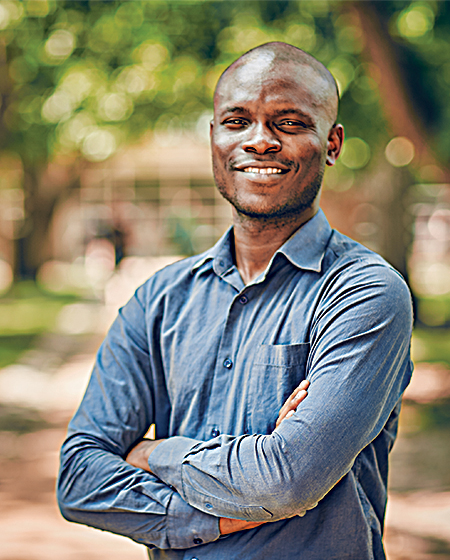
Kelsey Haddad, a fourth-year doctoral student in energy, environmental & chemical engineering, is one of the U.S. Scholars in the McDonnell International Scholars Academy. As a U.S. Scholar, she will study for at least one semester at one of the other universities in the academy.
“Understanding the link between energy and environment using chemical engineering principles is critical to sustainable use of abundant fossil fuels. This experience has really sharpened my mind and exposed me to the big challenges of the 21st century.”
— Adewale Adeosun
Adewale Adeosun, a fourth-year doctoral student from Nigeria, earned a bachelor's degree in chemical engineering in Nigeria and a master's degree in Dubai. He came to WashU with his wife and young son attracted by the unique opportunities offered by the Department of Energy, Environmental & Chemical Engineering that he says were "a perfect fit" for his previous education and research interests.
"I'm really passionate about finding a way to use my knowledge to help my country," he says. "Many people in Nigeria don't have electricity. If you really want to push a country forward, you need electricity, because that opens businesses."
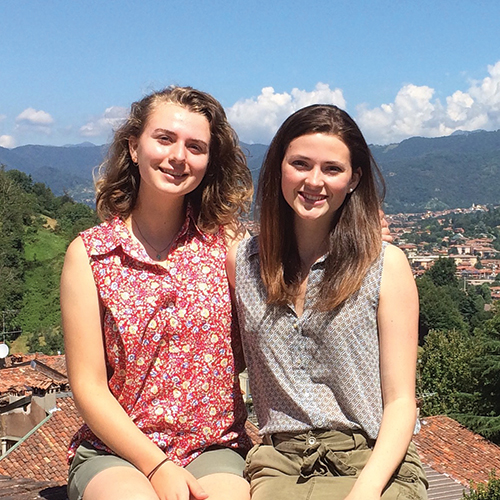
While Engineering has strong collaborations around the world, new programs and partnerships are being developed to continue enriching the global experience for students.
The MAGEEP Education Network recently launched to bring faculty from various institutions together to create content for courses that could be offered internationally to companies, industry and governments. Initial courses offered through the network include Energy for Leaders, Sustainability for Business, Water Treatment, and Fundamentals of Aerosol Science and Technology.
In addition, a program to allow doctoral students to be co-advised at both WashU and McDonnell Academy partners has begun, allowing doctoral students to do research at one of the other institutions.
Back to Engineering Momentum